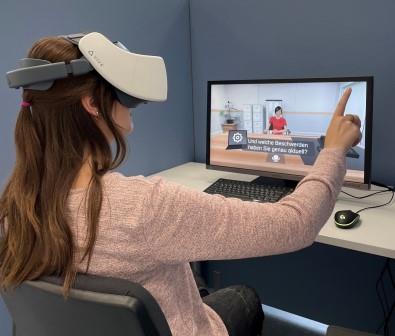LWL Pilot Project: Raumtänzer Develops Talk Show
Bochum / Rheda-Wiedenbrück – Patient discussions require a high level of sensitivity and deep empathy. Until now, emerging clinicians have only been able to gain this competence through hands-on experience with the right patients. Digital solutions can increase the odds with varying intensity and difficulty. In a pilot project with the LWL Psychiatric Clinic (Ruhr Bochum University), IT professionals from Raumtänzer are now developing a talk show. Explains Professor Dr. middle. George Jokel. The FLUX VR room dancer app and, in the future, FLUX 360° will be used for immersive visualization of the diagnostic conversation.
Medical expertise forms the basis for an accurate diagnosis and successful treatment. Confidence and empathy when speaking with the patient greatly contribute to the success of treatment. “This is why we focus on the best possible dialogue with patients in our education for our medical students,” Priv.-Doz says. Doctor. middle. Paraskevi Mavrogiorgo. Since it is not always possible to experience emotionally difficult situations with “real patients”, such conversations are simulated to a certain extent in student groups. FLUX VR now enables digital mapping of a patient’s entire conversation in virtual reality. In this way, interaction with the patient can be intensively trained and evaluated automatically. “This has an educational effect for students. A great added value is that a wide variety of clinical situations and images can be experienced without actual patients in the clinic or willing to participate in the classroom,” says Professor Jokel. Make a wrong diagnosis.
Up to ten exercisers
“Currently, Oculus Quest 1 and Oculus Quest 2 VR headsets and desktop computers are supported as end devices,” reports Christian Tershte from Raumtänzer. An internet-based web version is planned to enable remote training from home. In addition to the content, interactive behavior of students can also be included in the analytics. In addition, the simplest possible use should lower the damping threshold for the virtual world. “In the psychiatric laboratory at the University of Bochum, we have already set up VR stations where up to ten students can simultaneously complete immersive training – that is, immerse themselves in the virtual environment – using virtual reality glasses,” explains Professor Jockel.
Specific patient profiles and dialog content
In addition to visualization, one of the main tasks for IT professionals was to create and manage a Training Management System (TMS) via a central server. “We can create specific patient profiles in TMS and select all dialog contents,” explains Priv.-Doz. Mafrogorgo. Recordings of interactions between exercisers and simulated patients are saved and available at any time for joint debriefing. In addition, teachers can follow all the dialogues directly via the chat interface.
Two workstations installed in Bochum
The schedule is ambitious: “TMS is currently installed on two on-site workstations in Bochum and connected to the corresponding network infrastructure,” says Terhechte. The solution will be further developed as part of the assessment with students in the winter semester 2021. Looking to the future, “the new FLUX 360° solution also allows training from home and can be integrated into existing learning platforms,” says Terhechte, looking to the future. The obvious advantages will be: more flexibility for students, simultaneous learning from several labs, as well as the elimination of presence requirements.
Systematic behavior analysis
In addition, diagnostic training will be expanded to include additional content: CV, memory logs and various diagnostic tools can be stored. One of the core competencies of RUB Psychiatry is to include other aspects, in particular behavior analysis (facial expressions, posture, manner of speaking, gaze behaviour, etc.). Patients in the training simulation can also demonstrate more or less authentic behaviors that can be controlled using such parameters. For example, facial expressions, posture, and gesturing can be modified to match the patient’s clinical picture. The patient’s respiratory rate, blinking rate, and tremor can also be basic indicators that can be simulated in training.
For joint reasoning, biometric registration of trainees can also be visualized at a later time. For this purpose, appropriate indicators should be collected during diagnostic training. Simple indicators would be: complexity of language, length of questions or sentences, speed and volume, physical attention to the patient, eye contact, range and type of gestures.
Raumdancer creates individual VR solutions
Virtual reality specialists from Raumtänzer from Rheda-Wiedenbrück have been working on applications for communication, presentation and interaction for more than six years. From the context of university, research, and education, Space Dancers can build on more than 20 years of experience in virtual reality and avatars.
The in-house developed FLUX VR software is based on the FLUX Suite core software and is individually tailored to meet the needs of project partners. “At the beginning of 2021, Raumtänzer launched FLUX 360° as a presentation and virtual showroom,” adds Terhechte. “This allows training sessions and presentations to be mapped into augmented reality.”
The startup Raumtänzer, which launched in 2017, started as a spin-off at Bielefeld University in 2014. The company currently has 17 employees. In the core business, augmented reality (AR) and virtual reality (VR) software solutions have been developed at the Rheda-Wiedenbrück site in East Westphalia. The two administrative directors, Professor Dr. Thies Pfeiffer and Christian Terhechte have been developing AR & VR for over 20 years. In the fall of 2019, Trivago founder Rolf Schrömgens participated in a funding round. The main objectives are the expansion and further development of the modular software “FLUX Suite”. This allows companies to easily prepare their own content (videos, CAD animations, etc.) for augmented and virtual reality applications.
Company contact
Space Dancer GmbH
Christian Terkhet
Nickelstrasse 21
33378 Rheda-Wiedenbruck
05242 5500051
[email protected]
http://www.raumtaenzer.com
Media contact
AD HOC PR GmbH
Frank Rittig
Berliner Street 107
33330 Gutersloh
05241 903991
[email protected]
http://www.adhocpr.de
Image source: Simon Vanscheidt / LWL

“Certified gamer. Problem solver. Internet enthusiast. Twitter scholar. Infuriatingly humble alcohol geek. Tv guru.”





